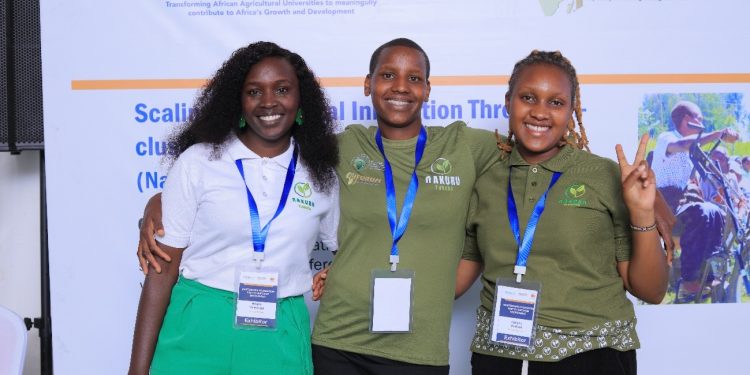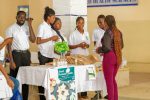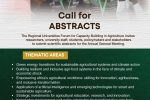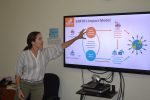Uganda Martyrs University Announces First Cohort of TAGDev 2.0 Program Scholars

Uganda Martyrs University is excited to announce the first cohort of 16 scholars for the Transforming African Agricultural Universities to Meaningfully Contribute to Africa’s Growth and Development (TAGDev 2.0) program.
The 16 scholars for the 2025/2026 academic year were selected from a competitive pool of 928 applicants, including 376 females, 552 males, 151 refugees and 53 differently abled persons. The selection committee meticulously evaluated each application with a deliberate effort to enhance gender balance and representation from marginalized groups, thereby setting a precedent for future cohorts.
Uganda Martyrs University joined the Regional Universities Forum for Capacity Building in Agriculture (RUFORUM) TAGDev 2.0 consortium in 2023 following a comprehensive due diligence exercise.
TAGDev: A Game-Changer in Agricultural Higher Education
In partnership with the Mastercard Foundation, RUFORUM in 2016 launched the Transforming African Agricultural Universities to meaningfully contribute to Africa’s Growth and Development (TAGDev 1.0), which has made significant strides in agricultural education. TAGDev 2.0, a scale-up to TAGDev 1.0 is a 10 year (2023–2033) program which brings together 12 African universities including; Malawi University of Science and Technology (Malawi), Africa University (Zimbabwe), University of Free State (South Africa), Gulu University & Uganda Martyrs University (Uganda), University of Eldoret & Egerton University (Kenya), University of Bamenda (Cameroon), University of Port Harcourt (Nigeria), University of Cape Coast (Ghana), National University of Agriculture (Benin), and Mohammed VI Polytechnique University (Morocco). These universities are committed to training the next generation of agricultural leaders and innovators for Africa.
The TAGDev 2.0 focuses on:
- Expanding equal work opportunities for young women and men in the agricultural sector
- Improving climate adaptive agricultural production and productivity of focus value chains
- Strengthening the quality of higher agricultural education outcomes in training, research and innovation
- Promoting science and innovation for entrepreneurship.
Below is a table listing the selected scholars in UMU
| No. | Applicant | Gender | Course |
| 1. | SOPA EMMANUEL | male | Bachelor of Agricultural Economics and Agribusiness Management |
| 2. | Lucy Acen | female | Bachelor of Agricultural Economics and Agribusiness Management |
| 3. | Enoch Nangiro | male | Bachelor of Agricultural Economics and Agribusiness Management |
| 4. | Iraguha Emmanuel | male | Bachelor of Agricultural Economics and Agribusiness Management |
| 5. | CAROLINE KAJOBE | female | Bachelor of Agricultural Economics and Agribusiness Management |
| 6. | Baitiyo Josephine Simon | female | Bachelor of Agriculture |
| 7. | PRISCA APIO | female | Bachelor of Agriculture |
| 8. | Rose Mary Malia | female | Bachelor of Agriculture |
| 9. | Nalwoga Desire | female | Bachelor of Business Administration and Management |
| 10. | Imalingat Catherine | female | Bachelor of Business Administration and Management |
| 11. | DENG PRISCILLA AYAK ADOR | female | Bachelor of Business Administration and Management |
| 12. | James Onen | male | Bachelor of Business Administration and Management |
| 13. | Josephine Kemanzi | female | Bachelor of Business Administration and Management |
| 14. | Rebecca Makhame | female | BSc. Science in Agriculture |
| 15. | NABBOSA AGNES | female | BSc. Science in Agriculture |
| 16. | Akech Teddy | female | BSc. Science in Agriculture
|
What This program Means for UMU
This scholarship award highlights UMU’s role as a hub for scientific excellence and innovation. Recipients will receive quality higher education, training and research for the betterment of society based on ethical values, with a philosophy derived from the Christian ideals of the human person. The University is committed to the integral development of students, through literal and scientific education in the Catholic tradition, and through a high degree of personal attention in spiritual and intellectually stimulating environment. The TAGDev 2.0 program is giving UMU an opportunity to develop individuals who combine career competence with a sense of moral responsibility, sound religious and social values, and the ability to innovate and adjust to the challenges of the modern world.
UMU’s TAGDev agenda
UMU’s motto, “Virtute et Sapientia Duc Mundum,” which means “In Virtue and Wisdom Lead the World,” sums up the University’s agenda for the TAGDev 2.0 program. The virtues and the wisdom of the Martyrs inspires the students and staff to go out to the whole world in order to make a difference in communities, in the nation and in the entire world. It is UMU’s plan, through implementation of the TAGDev 2.0 program, to make a difference in the lives of the students that will spill over to their communities. The University implementation strategy is guided by the values of equity and social justices, environmental protection, academic freedom, high ethical standards and gender equality to bring about transformation of the students’ lives. The issues of inclusivity and safeguarding, quality delivery of services and matching the teaching and learning to the changing demands of the economic arena are at the center of implementation to support students to learn various skills in entrepreneurship, community engagement and other competence-based skills. The implementation strategy involves providing an academic milieu that enhances the authentic formation and integral development of the human person, promote principles and values of sustainable development, and to promote a student-centered university that provides a needs-based, stakeholder-driven and excellent quality service delivery with practical approaches that expose students to job creation skills to generate wealth and employ other young people.
Why It Matters
TAGDev 2.0 is not just a scholarship program, it is a movement for transformation of African higher education institutions. It champions equity, innovation, and leadership, especially among youth navigating challenges of life including poverty, displacement, and climate vulnerability. Through its participation, UMU is nurturing future agricultural leaders who will become scientists, entrepreneurs, and policy leaders with potential to revolutionize Uganda’s agricultural landscape and contribute to Africa’s broader growth and development journey.






